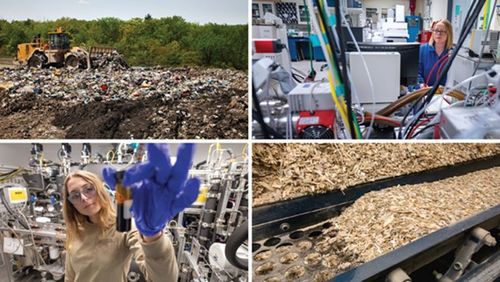DOE announces 4 additional projects to help industry address bioenergy, bioproduct challenges

SOURCE: U.S. Department of Energy
May 24, 2024
BY U.S. Department of Energy
The U.S. Department of Energy Bioenergy Technologies Office awarded $2.18 million in funding to four additional projects as part of the Feedstock-Conversion Interface Consortium (FCIC) 2023 Cooperative Research and Development Agreement (CRADA) call. Funded and led by BETO, the FCIC is a consortium of researchers at nine national laboratories dedicated to reducing the technical risks of biorefinery scale-up. This funding opportunity included competitively selected CRADAs between FCIC partner laboratories and partners from industry and academia interested in leveraging the capabilities of the FCIC.
Partnering laboratory researchers will collaborate with award recipients to understand, quantify, and mitigate the impact of feedstock variability across the bioenergy and bioproduct value chains.
The following projects were selected:
- Alder Renewables and the National Renewable Energy Laboratory (NREL) will work together to understand the impact of feedstock variability on bio-oil produced in the Alder Renewable Crude process.
- Novastus will work jointly with Oak Ridge National Laboratory to better understand the impact of municipal solid waste (MSW) variability in Novastus’s unique drying process.
- VERDE Nanomaterials will collaborate with Lawrence Berkeley National Laboratory, Idaho National Laboratory, and NREL to improve VERDE’s novel lignocellulosic nanofibril production process.
- West Biofuels and NREL will team up to investigate the impact of feedstock variability on the performance of the West Biofuels fluidized-bed gasification system.
Learn more about the selected 2023 CRADA projects and FCIC.
Advertisement
FCIC national laboratory partners include Argonne National Laboratory, Idaho National Laboratory, Lawrence Berkeley National Laboratory, Los Alamos National Laboratory, the National Energy Technology Laboratory, the National Renewable Energy Laboratory, Oak Ridge National Laboratory, Pacific Northwest National Laboratory, and Sandia National Laboratories.
Advertisement
Related Stories
U.S. fuel ethanol capacity fell slightly in April, while biodiesel and renewable diesel capacity held steady, according to data released by the U.S. EIA on June 30. Feedstock consumption was down when compared to the previous month.
XCF Global Inc. on July 8 provided a production update on its flagship New Rise Reno facility, underscoring that the plant has successfully produced SAF, renewable diesel, and renewable naphtha during its initial ramp-up.
The U.S. EPA on July 8 hosted virtual public hearing to gather input on the agency’s recently released proposed rule to set 2026 and 2027 RFS RVOs. Members of the biofuel industry were among those to offer testimony during the event.
The USDA’s Risk Management Agency is implementing multiple changes to the Camelina pilot insurance program for the 2026 and succeeding crop years. The changes will expand coverage options and provide greater flexibility for producers.
EcoCeres Inc. has signed a multi-year agreement to supply British Airways with sustainable aviation fuel (SAF). The fuel will be produced from 100% waste-based biomass feedstock, such as used cooking oil (UCO).
Upcoming Events










